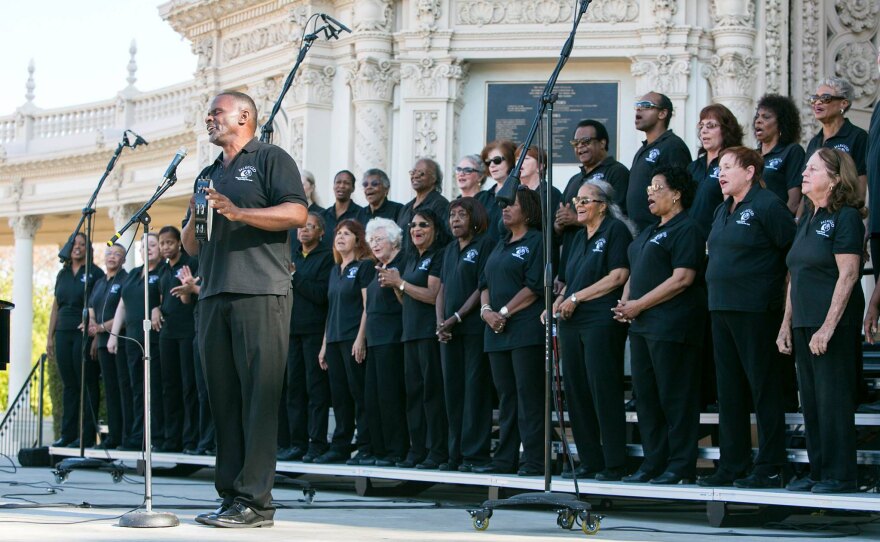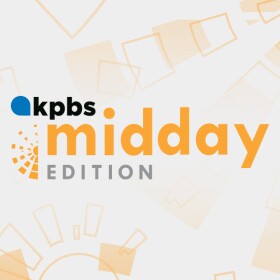In our last installment of the KPBS Summer Music Series, we turn to the world of gospel music and learn the history of African American spirituals, and the way they seeded much of popular American music.
The Martin Luther King Jr. Community Choir San Diego, or MLKCCSD, was formed in 1996, and has been spreading gospel music around the region and the world ever since. Ken Anderson is their founder and director, and he also directs the beloved UCSD Gospel Choir.
The spiritual's influence on American music
"From the Negro spiritual comes rag, swing, jazz, Blues, rock and roll, American country music, soul, pop, disco, even on down to hip-hop and rap," Anderson said. "They all eventually find their ultimate roots back in the Negro spiritual."
Including, of course, gospel.
Anderson notes that these genres of music can also be traced to other cultures, regions or ethnicities, but spirituals play a fundamental role in the development of modern American music.
Singing in code
The history of spirituals is intertwined with the strife of African American slaves, and the work of the abolitionists. Not all of the music is code, but many songs were coded, Anderson said.
"We're all sure that Negro spirituals are songs that the slaves sung to communicate with each other how and when and where they were going to get away — opportunities of freedom. In the songs you will find stories, mentioning of the Jordan River which is a code name for the Mississippi, the Ohio River, the Cincinnati rivers, pretty much any body of water from the bible — Jordan River, the Red Sea, is a code name for a body of water in America," Anderson said.
He also noted that leaders in the bible served as code names for leaders in the abolitionist movement. Moses was often a stand-in for Harriet Tubman, Anderson said.
"These were leaders in the bible, they were code names for the abolitionists and other workers. These were Black, white, Hispanic, Asian, just Americans everywhere working together to help slaves get away, to free states, to Canada. I even learned of some even escaping to Europe," Anderson said. "And when they sang about going home or the Promised Land, or Beulah Land — pretty much any good destination — this was a code name for freedom. So in these songs, they were actually communicating."
This system of communication, Anderson said, was how the Underground Railroad was able to function.
Some of the songs express a faith in God, even when institutionalized religion in the American South was predominantly pro-slavery. "And some of the songs they were singing were just encouraging one another. But when you get to songs like 'Steal Away,' and 'Swing Low, Sweet Chariot,' 'There Is A Balm In Gilead,' 'Let Us Break Bread Together on Our Knees,' and on and on, when you get to songs like this, they were actually communicating. This is when and where and how we're going to get away to freedom," Anderson said.
The encouragement, and lifting each other up during times of deep strife and trauma, was still a critical undercurrent of the music.
"They would sing songs like, 'I'm so glad that trouble don't last always,' or 'Lord help me to hold out until my change comes,' you know and things like that, they're encouraging one another to hold on, keep your hand on the plow, hold on," Anderson said. "They were living in a terrible time. They were basically livestock. They were basically property, families broken up, beaten and made to work for indentured, forced labor."
'Please get the kid off the piano'
Anderson got his start with music in church, the Black pentecostal congregation of the Church of God in Christ.
"I was four years old when my mother taught me my first song, 'Jesus Keep Me Near the Cross,'" Anderson said.
At age five, he took a field trip to the opera and was inspired by the way an orchestra took a song and divided it among the instruments. With his piano playing, he'd try to emulate this.
By the time he was six, he'd play piano during church — though not everyone was a fan.
"There were many people in the congregation, if not all, saying 'Please get the kid off the piano.' The pastor said 'Leave him alone; he's the only one showing any interest,'" Anderson recalled.
His love for classical music grew, and was introduced to Beethoven and Tchaikovsky in middle school, played in the band, and even after seeing a movie would come home and try to figure out how to play a particularly good score.
"I wouldn't know what key, I don't have a perfect pitch, but I can pretty much reproduce a sound in any key," Anderson said. Ultimately he started taking music lessons so that he could get the theory behind the music.
In his late teens, he took over as the head of the music department at the church. "From there, I've been directing and singing and playing. There you have it," Anderson said.
A choir for community
"[The choir] came from a tradition that across the nation, ministerial alliances come together at Martin Luther King's birthday, and they form what they call a commemorative choir as well, for that particular observance. And so it's a concert and the monies that are raised provide scholarships for young people," Anderson said of the choir's origins. Locally, the group sang annually to a significant audience, usually at Copley Symphony Hall.
One year, Anderson was asked to prepare the choir that year in San Diego. "And after that performance, a handful of the choir members approached me and said, 'We'd like to become a regular choir,'" he said.
They used the name Martin Luther King Jr. Community Choir San Diego, or MLK Choir San Diego. The ensemble performs September through June, and funds raised from concerts and album sales still go to fund youth scholarships. It's a non-audition choir: Anyone who wants to can sing, and the group usually ranges from 80 to 100 members.
"The amazing thing is this incredibly magical sound that comes from all of them together," he said.

Anderson said that the three things the choir loves to do the most are to sing, laugh and travel, and the group manages to achieve all three as often as possible.
Before the pandemic, they took a trip to Washington DC and performed on the steps of the Lincoln Memorial and at the US Capitol. They've also performed at the Martin Luther King, Jr. memorial. Anderson said they were the first musical group in the United States to do so.
Internationally, they've traveled to seven different countries so far.
"Very few people, even in the Black church, know the history of the music. So I always give the history of the music. I always educate on the music before we begin," Anderson said.
Gospel music's relevance right now
"I don't know if gospel music fits into a particular moment so much as it fits into life. Gospel music speaks to every aspect of life, even the time of life we're in now, because the music is born out of a hard time. I mean, this is not the first time America's been in a hard time. And I think there are times when America seems to be doing very well, but there's always a part of America that's not doing so well," Anderson said.
As for the hope and rejoicing found in gospel music despite the strife, Anderson likened it to the end of a news broadcast.
"They kind of fake shuffle their papers while they smile and tell you to have a good night after they just told you the world is about to go under," Anderson joked. "There's a lot in this world to stress you out, but there's also a lot in this world to be thankful for and to rejoice over."
The choir recently resumed rehearsals for their new season, and are working on their third album. You can learn more at their website.
Catch MLKCCSD's Ken Anderson and Dale Fleming as part of the Bodhi Tree Concerts 10th Anniversary Celebration, Saturday, Sept. 25 at 7 p.m. at St. James-by-the-Sea Episcopal Church.








